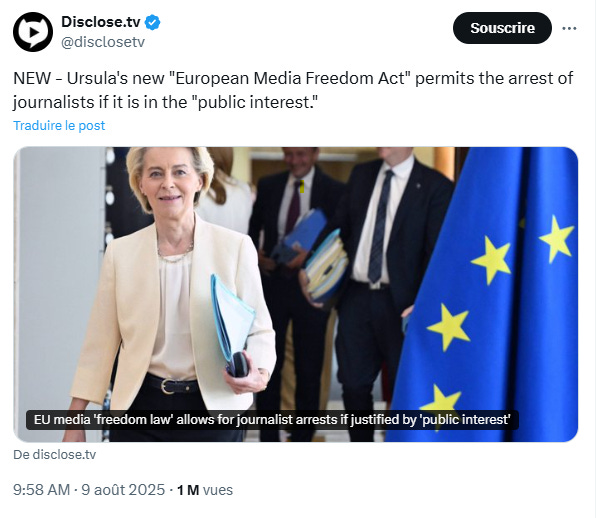All journalists in the slammer!
The European Media Freedom Act firmly does NOT allow for journalists to be arrested, so that they give away their sources.
Some people react so viscerally that it’s hard to believe they can still think straight, as if their minds are too clouded to read the European Media Freedom Act for what it actually says, rather than what they desperately want it to mean. They’re like Pavlov’s dogs, conditioned to bark on cue. If the functioning of the EU is anti-democratic and highly questionable, all EU regulations are not inherently bad.
This isn’t about championing the EU—it’s about staying honest and objective.
Claiming the European Media Freedom Regulation allows journalists to be detained to coax them to expose their sources is pure delusion. This EU regulation explicitly protects them, stating the complete opposite.
“Article 4, Rights of media service providers
1. Media service providers shall have the right to exercise their economic activities in the internal market without restrictions other than those allowed pursuant to Union law.
2. Member States shall respect the effective editorial freedom and independence of media service providers in the exercise of their professional activities. Member States, including their national regulatory authorities and bodies, shall not interfere in or try to influence the editorial policies and editorial decisions of media service providers.
3. Member States shall ensure that journalistic sources and confidential communications are effectively protected. Member States shall not take any of the following measures:
(a) oblige media service providers or their editorial staff to disclose information related to or capable of identifying journalistic sources or confidential communications or oblige any persons who, because of their regular or professional relationship with a media service provider or its editorial staff, might have such information to disclose it;
(b) detain, sanction, intercept or inspect media service providers or their editorial staff or subject them or their corporate or private premises to surveillance or search and seizure for the purpose of obtaining information related to or capable of identifying journalistic sources or confidential communications or detain, sanction, intercept or inspect any persons who, because of their regular or professional relationship with a media service provider or its editorial staff, might have such information or subject them or their corporate or private premises to surveillance or search and seizure for the purpose of obtaining such information;
(c) deploy intrusive surveillance software on any material, digital device, machine or tool used by media service providers, their editorial staff or any persons who, because of their regular or professional relationship with a media service provider or its editorial staff, might have information related to or capable of identifying journalistic sources or confidential communications.”
This regulation strictly bans any arrest, search, physical or digital surveillance, or intimidation tactics against journalists and media organizations. By 'media organization,' it means any economic activity dedicated to informing the public—distinct from advertising, PR, or corporate communications and other propaganda activities—whether pursued by an individual or a corporation.
Since its founding, the European Commission has stood as the guardian of EU treaties, ensuring Member States implement and uphold European law. This is nothing new—it's business as usual.
The European Media Freedom Act essentially weaves much of France’s press law into the EU framework. Want to claim press enterprise status and enjoy perks like a 2% VAT rate or reduced social security contributions? You’ll need to face the Joint Committee on Publications and Press Agencies and submit the same details required by this EU regulation—no surprises there.
When it comes to administrative electronic surveillance, forget Arcom, the broadcast regulator. The watchdog is the National Commission for the Control of Intelligence Techniques (CNCTR). Judicial interceptions? Those are ordered by an investigating judge, but only for crimes carrying over three years in prison, when absolutely critical to the case, and limited to four-month stints, renewable as needed.
This regulation introduces robust protections that France previously lacked. That’s why the airwaves are silent—there’s simply no controversy to stir.
Let’s be clear: journalism isn’t a shielded profession with blanket immunity. The freedom to inform doesn’t grant a free pass to break the law, official press ID or not—and by the way, you don’t need a press ID to be a journalist.
If a journalist commits a crime while working, they’ll face the consequences like anyone else. And if they’re cozying up to, say, a terrorist or criminal group in ways that blur professional boundaries, they can expect surveillance. This isn’t new—just ask Ariane Lavrilleux about her run-ins with the law.
The French government and its political elite have long kept journalists and the press under tight surveillance, often crossing into outright lawlessness. From the wiretapping scandals targeting Le Canard Enchaîné to the Élysée’s so-called anti-terrorist unit in the 1980s and the brazen attempt to raid Mediapart’s offices, the pattern is clear. Don’t be fooled—this overreach persists, frequently through shady, illegal operatives. In principle, this European regulation should slam the brakes on such abuses




